
Our Students & Alumni
Here's what alumni say about our program:
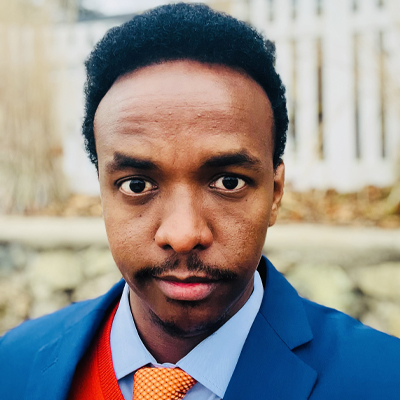
Ahmed Abdidool
ISCOR, 2022; Master’s candidate, Sustainable International Development, Brandeis University
"My home country, Somalia, has been in upheaval for the past three decades. It has
faced insecurity, recurrent humanitarian crises, and warring factions that have agreed
to disagree. When I arrived in the United States, I came to San Diego, and I vividly
remember browsing San Diego State's website to learn about its programs. International
Security and Conflict Resolution (ISCOR) captivated me when I first saw it on the
list, although I wasn't ready to start college just yet. [Several years later] not
only did I get to SDSU, but I majored in ISCOR. As an ISCOR major, I was surrounded
by a diverse group of students and taught by top-notch, dedicated professors who were
passionate about their work. I'm incredibly grateful to SDSU and its faculty and staff
for making this possible. Without their enlightening lectures and guidance, I would
have been absolutely lost in my current environment; I'm now a better representation
of myself. It's like a dream come true that I'll forever be an Aztec Iscorian!"
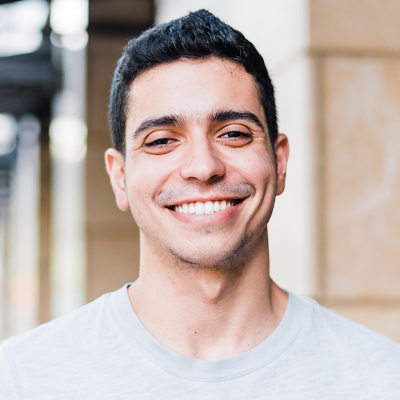
Bandar Alsaaed
ISCOR, 2015: Ph.D. candidate in Middle Eastern Studies, Columbia University
"ISCOR's interdisciplinary focus and diverse range of course offerings was just what
I needed to find my academic footing in my first years of university. As an international
student, the program's multi-faceted approach to global affairs allowed me to make
sense of my own place in the world. Through ISCOR, I both understood the nature of
the present predicaments we face globally, and learned how to chart practical paths
forward. Throughout my time as an ISCOR student, the faculty members have mentored
me and nurtured my specific academic and professional interests, which have continued
to shape me. The skills I developed in the program, culminating in writing a senior
thesis under close faculty guidance, have equipped me to navigate my current path
in graduate school and have motivated me to contribute to the service of others through
teaching, research, and mentorship."
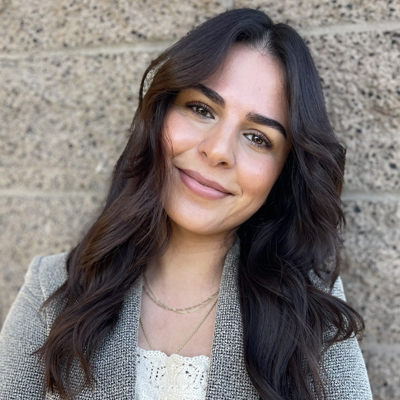
Sara Anas
ISCOR, 2020; Associate Director of Refugee Services, Lutheran Social Services
"The main aspect of ISCOR which I found useful was the interdisciplinary nature of
the program. It allowed me to explore many different topics and courses of personal
interest outside of a traditional pathway, while still staying focused on an end goal.
After graduating in 2020, I moved to London for a master’s program at King’s College
London. I then transitioned the multitude of courses I took into a career within the
nonprofit sector focusing on advocacy and services for refugees. I currently have
a position at Lutheran Social Services as the Associate Director of Refugee Services.
ISCOR not only gave me a meaningful degree but allowed me to expand my knowledge and
become a better all-around person."

Brianna Bradley
ISCOR, 2018; Intelligence Analyst, Defense Intelligence Agency
"ISCOR introduced me to the world of international affairs and first piqued my interest
for how I could get involved in that field in my second year of college. I always
knew that government and politics interested me, but Through the core classes and
the electives, I realized I wanted to work at the heart of national security focusing
on global issues like those we studied in class. The program’s connections and internship
option provided the exposure that helped me choose the job I have now."
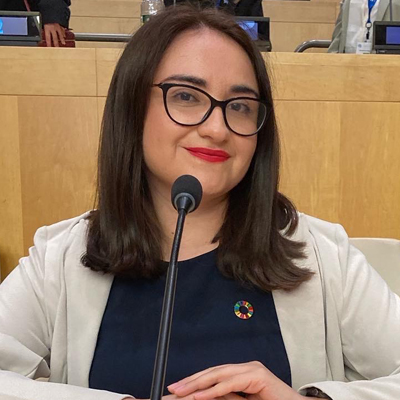
Brenda Garcia Millan
ISCOR, 2014: Research and Policy Analyst at Climate Action Campaign
"The ISCOR program prepared me to understand diverse views on complex topics like
human displacement and social and environmental justice. It specifically helped me
recognize and respect "ways of being" that are not necessarily my own, which has helped
me thrive in different international experiences including my Fulbright Program in
Spain in 2018."
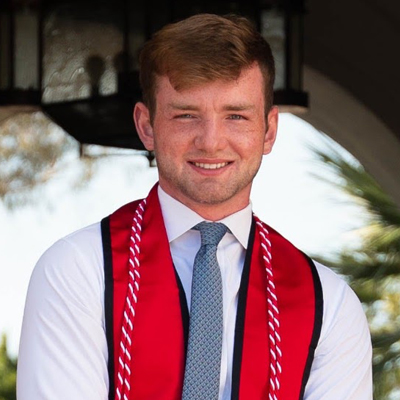
Marcus Mildenberger
ISCOR 2022; Graduate Student, US Foreign Policy and National Security, American University
"The International Security and Conflict Resolution program at SDSU features the perfect
combination of historical literature, theoretical discussion, and contemporary global
political analysis for students inspired to change the world around them. The ISCOR
Department features some of the most knowledgeable and passionate professors I have
ever met, who are all deeply committed to creating a more compassionate and just world.
Each one of my courses helped expand my global perspective and gave me experience
simulating real-world conflicts and finding pragmatic solutions in a controlled environment.
I cannot recommend this program enough to any undergraduate looking to learn more
about global institutions and the history behind the numerous political and economic
systems around the world that continue to have such a strong role in human history."
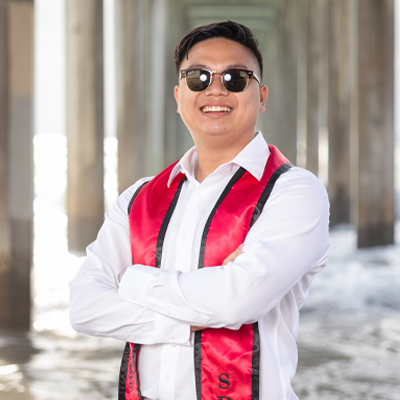
Brandon Nguyen
ISCOR; 2025 Information Technology Consultant, San Diego State University and Graduate Student, Homeland Security Program, San Diego State University
"As a proud alumnus of the ISCOR undergraduate program, I’ve had the opportunity to
connect classroom theory with real-world application. This program’s focus on real
world experience led me to an internship with the San Diego Law Enforcement Coordination
Center where I worked alongside professionals in intelligence and counterterrorism
gaining exposure with threat analysis and multi-agency coordination. In addition to
the internship, the required international experience led me to living in Japan to
further expand my perspective on international diplomacy and security through a global
lens while developing my intercultural communication skills. The ISCOR program was
a perfect match for my interests and career goals. It not only deepened my understanding
of global security challenges, but also prepared me to transition seamlessly into
SDSU’s M.S. program in Homeland Security. These experiences have made a career in
international relations and global security attainable and have presented me with
countless opportunities where I can contribute to building safer, more resilient communities
both at home and abroad."

Ashley Rodriguez
ISCOR, 2011; Development Director, Voice of San Diego
"ISCOR was the perfect way for me to gain insights and knowledge on a variety of places
and pressing issues in today’s global economy. I found it exciting to learn how institutions,
individuals, and socioeconomic forces work in parallel and perpendicular to one another.
From sociology and communications, nuclear weapons and economic development, the world
is your oyster with ISCOR. It helped me gain cultural competencies and the requirement
of studying abroad was an unforgettable experience. ISCOR directly contributed to
my understanding of governments and institutions, economic mobility, the importance
of civic participation and more which I use every day in my role helping investigative
journalists hold people in power to account."
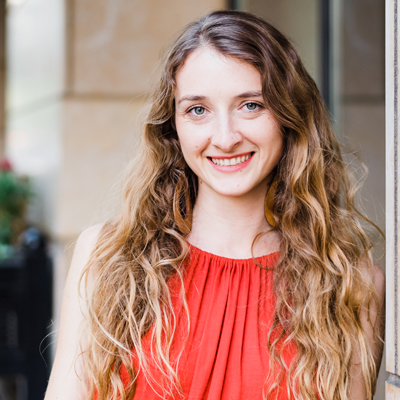
Marna Shorack
ISCOR 2015; Senior Program Coordinator (International Programs team), Kids in Need of Defense’s (KIND)
"As a student who was eager to pursue a career in the humanitarian sector, the ISCOR
program expanded my knowledge and ability to engage critically in international conflicts,
world politics and social problems. Among the aspects that I appreciated the most
about ISCOR, was its interdisciplinary nature, diverse range of courses offered, and
the approachable disposition of its professors. The study abroad opportunity and internship
requirement also allowed me to broaden my international experiences, which have been
essential in my current position in the nonprofit sector."
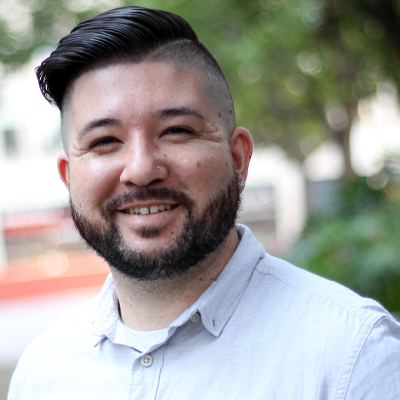
Shawn Voutour
ISCOR, 2014; Ph.D. student in Political Science and International Affairs, University of Georgia
"I enrolled at SDSU as an undeclared student and as I was deciding what major I wanted
to declare, I was drawn to ISCOR because of its interdisciplinary nature. Having the
ability to craft my own specialization within the major by taking courses from other
departments coupled with the major's study abroad requirement is what garnered my
interest in the program, and it is what makes it so unique. Students learn how to
analyze and approach global issues with an international perspective in mind and this
is strengthened by studying in another country and trying to apply what you have learned.
I spent two weeks in Istanbul, Turkey to meet my study abroad requirement and it was
such an amazing experience as we developed an understanding of Turkey's place in the
world at large and it led me to declare a minor in Islamic and Arabic Studies to accompany
my major. The work of the ISCOR faculty helped me develop my own academic interests
and desire to educate others, which has guided my way through graduate school."
ISCOR Student Society
The ISCOR Student Society is a student-run organization that provides both ISCOR and non-ISCOR students an opportunity to meet outside of the classroom setting to network and engage with peers. It brings guest speakers from different fields to foster multifaceted conversations on global topics.
The Student Society meets every other Tuesday. Please contact the ISCOR Student Society at [email protected] or follow the ISCOR Student Society Instagram Page to learn more about the organization and upcoming events.
Meet Our Graduates
ISCOR in the News!
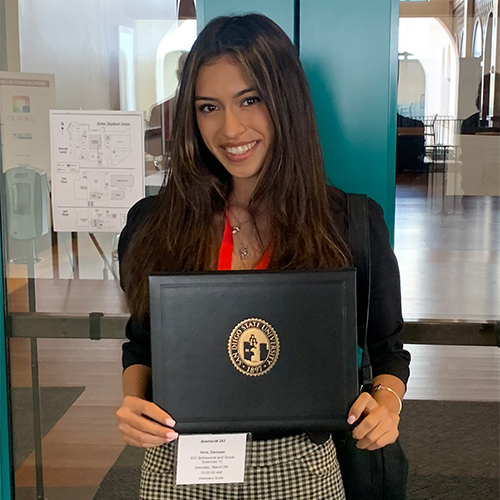 ISCOR Congratulates Denisse Vera Romo for winning a College of Arts and Letters Dean's Award at the Student Research Symposium
(SRS) 2022 event. Denisse presented her work: "Female Genital Mutilation in Kenya
in comparison to Somalia." Cheryl O'Brien, Ph.D. (Political Science), was her mentor.
ISCOR Congratulates Denisse Vera Romo for winning a College of Arts and Letters Dean's Award at the Student Research Symposium
(SRS) 2022 event. Denisse presented her work: "Female Genital Mutilation in Kenya
in comparison to Somalia." Cheryl O'Brien, Ph.D. (Political Science), was her mentor.
Is Covid-19 Africa’s Gender Pandemic?
August 9, 2020
By Forbes Africa
Suma is also the COO and Co-founder of Sleepless in Monrovia
Naomi Moore is the 17th SDSU student to earn the national scholarship that promotes language and cultural fluency.
SDSU NewsCenter
August 28, 2019
By Aaron Burgin
A San Diego State University undergraduate won a prestigious scholarship that allowed her to participate in an intensive language immersion program this summer.
Naomi Moore, a fourth-year double major in International Security and Conflict Resolution (ISCOR) and Arabic Studies, was accepted into the Critical Language Scholarship program — an intensive overseas language and cultural immersion for U.S. graduate and undergraduate students.
Moore studied Arabic in Tangier, Morocco, continuing the robust tradition of Aztecs that have participated in the extremely selective program, said Ryan McLemore, a study abroad adviser in SDSU’s International Student Center. Moore was the 17th Aztec to participate in the CLS program since its inception in 2006.

“We’re very proud of Naomi and all of the students who applied for this competitive and prestigious scholarship,” McLemore said. “We had three students who were finalists and three alternates for summer 2019.”
Students accepted into the competitive program spend eight to 10 weeks abroad studying one of 15 languages deemed critical to national security and economic prosperity.
Moore urged other students to consider the CLS program.
“The culture and this program were definitely more challenging than expected, but my Arabic has significantly improved,” Moore said. “If anyone is looking to experience cultural immersion, develop and strengthen their language skills and meet others with similar interests, I would definitely recommend CLS to them.”
Sponsored by the U.S. Department of State’s Bureau of Educational and Cultural Affairs, the CLS program helps scholars rapidly achieve language and cultural fluency by immersing them in intensive language instruction and structured cultural enrichment experiences.
Students receive a full scholarship that covers travel, tuition, housing and a living stipend, one year’s worth of undergraduate language-class credit, certification of their language gains and noncompetitive eligibility for U.S. government jobs for up to three years after program completion.
McLemore said that programs such as CLS “level the playing field” in study abroad by making it accessible to everyone.
“CLS is the perfect response to those who may think study abroad is too expensive or there are no funding opportunities available,” he said. “We are working hard to make students better-aware of the wide array of funding available to support international experiences.
“There are numerous scholarships to support students engaging in regions and countries critical to U.S. national security and economic prosperity, so again we encourage students to consider going off-the-beaten path … to those equally welcoming and culturally rich destinations.”
McLemore said he is encouraged by the increased interest in the program by SDSU students.
“We have many applicants for Arabic language because that is a prominent language taught at SDSU,” he said. “Similarly, there are multiple applicants for Chinese (Mandarin), Japanese, Russian and Korean because those languages are also taught at SDSU.
McLemore noted the recent addition of Portuguese to the CLS program opens opportunities for exposure to Brazil and Mozambique.
Students interested in the Critical Language Scholarship program can visit clscholarship.org for more information and can also view information on scholarships in the Aztecs Abroad database or contact the SDSU Study Abroad office at [email protected].
SDSU NewsCenter
March 27, 2019
By Leslie L.J. Reilly
San Diego State University students from a variety of disciplines will head to Phnom
Penh, Cambodia, for eight-week internships this summer through the newly created Mundt
Peace Fellowship Program.
The internships, developed by the College of Arts and Letters with a gift from the William R. Mundt Peacemakers Fund, give SDSU students opportunities to participate in the work of non-governmental
agencies (NGO), governmental aid agencies, combined public/private aid/peace efforts,
humanitarian organizations and social entrepreneurships seeking to alleviate social
and economic inequalities.
Mundt (’68) passed away in 2014. His son, Andrew, and friend, Davida Huchel, are co-trustees of the Mundt Peacemakers Fund. Huchel said Mundt was unsettled by
the violence he witnessed during World War II and the Cold War. After earning a master’s
degree in psychology from SDSU, he became an adviser at the Wesley Center on campus.
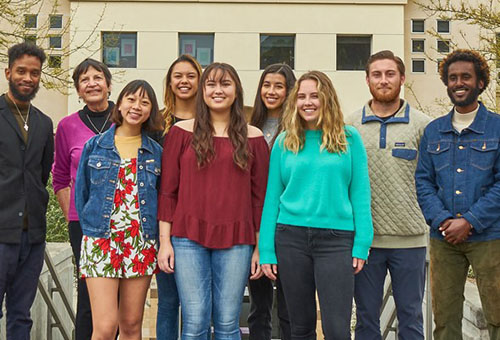
The 2018-19 Mundt Peace Fellowship winners with Davida Huchel, co-trustee of the Mundt Peacemakers Fund
Huchel said she and Andrew Mundt “were attracted to Cambodia for the diversity of opportunities the participating nonprofits
in the country would provide students.” These include education; art and music; the
environment and sustainability; law and social justice; and healthcare and social
welfare.
“We are also conscious of Cambodia's recent history of genocide and reconciliation,”
Huchel said. “We hope that Cambodia will stand as a cautionary tale, but also offer
insight into how a nation heals.”
More than 100 students applied to the fellowship program. Fifteen were interviewed
and nine were chosen as 2018-19 awardees:
Grace Megginson, child & family development major and Samuel Hagos, international security and conflict resolution major, will assist in daily operations
of the People Improvement Organization, which provides education and shelter for disadvantaged
children who live in the area and aims to break the cycle of poverty.
Bilal Mohamed, comparative literature major and Britney Budiman, urban studies major, will work with the Cambodia Living Arts organization, which
was established by a genocide survivor and musician. This NGO supports people developing
their careers in the arts, along with traditional and endangered performances and
rituals.
Madilynn Reynoso, interdisciplinary studies major in chemistry/biology/psychology, and Veronica Coen, cell molecular biology major, will assist doctors, nurses, and dentists at One-2-One,
a nonprofit that aims to meet holistic needs of disadvantaged and vulnerable children
who are orphaned, people living in urban slums, families who can’t afford medical
care, prisoners and people with HIV.
Maya McHale, international security and conflict resolution major, and McKenna Avery, sustainability major, will assist in the development of community forest, fishery,
and eco-tourism projects for Culture and Environment Preservation Association (CEPA),
an NGO focused on environmental, community-based natural resource management, biodiversity,
water governance and climate change.
Gabriel Wahl, journalism major, will support projects spearheaded by Legal Aid of Cambodia (LAC),
an NGO providing free legal services in both civil and criminal cases to vulnerable
and disadvantaged people.
“I’m excited to help people that don’t have options. When we live in our bubble, we
don’t have a chance to see underdeveloped countries and this will give me a chance
to make an impact,” Reynoso said.
CAL News
Summer 2019
By Leslie L.J. Reilly
With only two-and-a-half weeks to prepare, Ashley McMichael, a freshman majoring in International Security and Conflict Resolution (ISCOR) took on the daunting task of applying for a UK Fulbright scholarship. She spent “a ridiculous amount of time” writing and reviewing her 1,395-word application and 749-word essay. She passed the rigorous application stage and was invited in for a personal interview. McMichael didn’t feel she performed well during that interview, so when she received the acceptance notice, she had to read it several times before she believed that she, indeed, was selected as one of three scholarship recipients from SDSU. “I was completely overwhelmed and in disbelief.”
Fast-forward to July and she’s now studying at Queen’s University Belfast, in Northern Ireland. This is McMichael’s first trip abroad. In-between side-trips and studying she shared the experience of the first half of her four-weeks on the Emerald Isle.
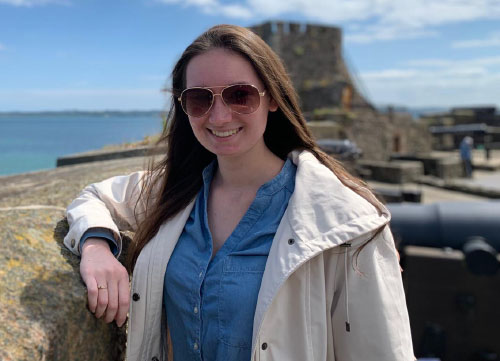
Ashley McMichael is a first-year ISCOR student. She is studying abroad for the summer semester in Northern Ireland at the Queen’s University, Belfast.
Q: What is your focus area of study in Belfast, Northern Ireland?
A: I’m studying Conflict Transformation in Belfast. As an ISCOR major, this has been a completely unparalleled opportunity to study my focus area. My program has largely focused on Conflict Transformation during and after the era of the Troubles, and thus far, we have covered areas such as transitional justice, dealing with the past, trauma, borders, and policing, all in the context of the Troubles.
Q: Have you had a chance to research and connect with people impacted by the Troubles yet?
A: Throughout the entire program, we have heard snippets of peoples’ lives from the era of the Troubles. We have heard from people in securitization aspects as well as people whose everyday lives were impacted forever by acts of violence. However, it is during the field trips and excursions out to the town that I feel that I have truly been exposed to the reality of the situation. From hearing about Bloody Sunday from a relative of one of the men killed during the event to the perspective and experiences of people at pubs, the memory of the Troubles truly is everywhere in Belfast, and I have been able to hear about it from both sides.
Q: How do you expect meeting them will change, inform, or enhance your research?
A: Meeting these people and hearing their experiences has truly made the Troubles real for me. Hearing about a subject from an academic lens is one thing, but it is completely different to listen to people who have personally experienced events. That has been one of my favorite parts of being here and of studying this subject matter, as I feel that it is what has really made me understand the Troubles best. Putting a face and emotion to something so broad makes it more understandable. In terms of enhancing my research, I would say that this has truly opened my mind and solidified my understanding of the knowledge that we are gaining in class.
Q: What are examples of cultural differences/similarities you have noticed during your first time abroad?
A: I suppose it’s easier to look at the differences than the similarities, as those are what we notice first. One cultural difference that really surprised me and continues to throw me is that pedestrians don’t have the right of way here, and that drivers don’t stop. My friends and I have almost been run over a few times while we’ve been walking across the street. Something else that has been very different is the fact that most places, whether they are pubs or restaurants, don’t split the check. There’s a “round buying culture” here, and that has proven very difficult for me and my friends to wrap our minds around when we’re out eating, as we’re so used to each paying for our own meals.
Another difference that has been harder to adjust to is the fact that most stores close early here. During the weekdays, most stores close at six or seven (this was extremely frustrating when my luggage was lost and we got out of class after four). Many places are also closed on the weekends, particularly Sundays.
One of my favorite cultural differences is the abundance of live music in this city. It absolutely comes alive at night, and there’s a great appreciation for live music that I haven’t seen as much in the U.S. People here have been very friendly so far, and that has been such a pleasant experience, especially with this being my first time abroad.
In terms of similarities, there are still many things that remain the same between the cultures. People enjoy having fun and they love socializing. Especially because the language is the same and our culture is so tightly connected with this part of Western Europe, many things have been very similar, and I’ve appreciated the familiarity and universality of that.
Q: Where are you conducting your studies? What is unique about the city?
A: I’m currently studying at Queen’s University Belfast, which is in the center of Belfast, Northern Ireland. It’s an absolutely amazing university that looks like a castle on the outside and has a completely modern interior, and I adore it. This city is so unique because it has so much history in it, especially given the events of the Troubles in the latter half of the 20th century. This history is still very much alive in the memories of people, but you can also see much of it in the conflict architecture (i.e. the peace walls). This is something that I haven’t seen anywhere else; the landscape of this modern city bears the scars of the conflict itself. The city is also trying to rebrand itself, and you can see that everywhere you go. It’s making its way out of the shadow of the Troubles and is making an effort to become a tourist attraction, and this is something that I’ve found fascinating while I’ve been here.
Q: Who is in your cohort?
A: In my program of Conflict Transformation, there are about 58 students. Amongst the three programs, I believe there are around 90 students. It is a very international crowd; many are either from the U.S. or Australia, but there are also people from Austria, Spain, Germany, Israel, and Canada whom I have met. I originally expected that the students would all be undergraduate students, but there are actually quite a few people who are taking a gap year or who are in some sort of postgraduate work. The ages themselves range from 18 to 65+; it truly is a diverse group. As far as studies are concerned, I have met people from an array of studies within Conflict Transformation. Sociology, political science, international relations, criminology, and law are the most common ones that I have heard, but we really do have some of everything.
In the Fulbright group itself, there are six of us total, and two in each of the summer school programs. They’re from all across the country, with four of them being from various places in the Midwest and one from Georgia.
Q: How do you think this experience will impact your life?
A: Already, I have been exposed to so much that I would not have been able to see otherwise. From learning to be independent to adapting to a new country to having the opportunity to see these amazing sights, I know that this experience will stick with me forever. Within the educational aspect, I’ve learned an enormous amount about my area of study in such a short time, and I know that I’ll be able to bring this experience back to my classes at SDSU. I honestly think that this independence and being adaptable will return home with me, as it is very confidence-inspiring to know that I am fully capable to deal with some of the situations I have been presented with during my time here. Beyond that, however, the friends who I have made are such genuinely wonderful people with such bright futures ahead of them, and it is inspiring to know that I will have them in my life. Overall, the first two weeks of this experience has already helped to provide me with more direction and desire to see the world.
Although I’m only halfway through the program, this has already been one of the most life-changing events of my life. I never expected to be doing something like this after my first year of college, and it has exceeded all of my expectations. I’ve been able to see and do things that I didn’t imagine myself doing for another few years, from hiking up Cave Hill to visiting Giant’s Causeway to casually strolling around eight-hundred-year-old castles. The friends I’ve made through Fulbright and through the program itself are people with whom I definitely intend to stay in contact, and their company has contributed to this trip being as excellent as it has been. I truly only have the best things to say about this experience.
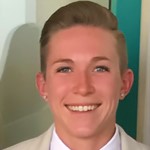 Ellison Grove, B.A. International Security and Conflict Resolution, minor in Russian
Ellison Grove, B.A. International Security and Conflict Resolution, minor in Russian
Grove, a standout member of the track and field team, is one of 15 student-athletes
honored this year with the Malik Award for students who maintained a 4.0 GPA over
the previous two semesters. She also pulled off the remarkable feat of earning the
award all four years at SDSU, even as she served as captain for two years and set
school records in the 600 meters (1:31:48) and indoor 800 meters (2:09.67).
Grove’s academic interests led her to become a teaching assistant in the International
Security and Conflict Resolution (ISCOR) program and join the ISCOR Student Society,
serving as treasurer for three years.
She held Washington, D.C., summer internships all four years, including one in the
office of U.S. Rep. Mike Conaway (R-Tex.). A native of rural Catharpin, Virginia,
she plans to pursue a master’s degree in international relations and diplomacy, and
a career in the field of diplomacy.
SDSU NewsCenter
July 7, 2016
By Coleen L. Geraghty
Ellison Grove is racing toward more than an 800-meter record.
In the world of track and field, the 800-meter race event is an outlier. Too long to classify as a sprint and too short to fit snugly into the long-distance bracket, the race demands a finely calculated blend of speed and endurance.
The unique challenge of the 800m suits Ellison Grove. Recruited from Battlefield High School in rural Catharpin, Virginia, Grove has the mental and physical toughness necessary to compete in this middle-distance race. After two years at San Diego State University, she maintains a perfect 4.0 GPA and claims several spots in the Aztec record books for her feats on the track.
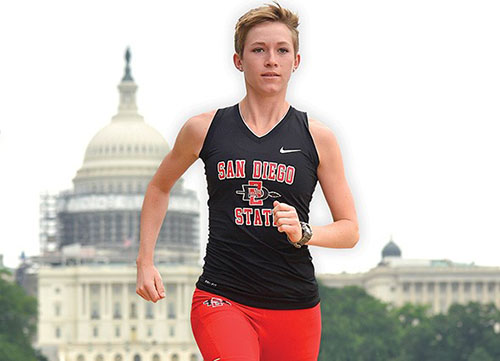
Aztec runner Ellison Grove has an internship in Washington, D.C. this summer. Photo: Mike Theiler
Grove was one of 14 Aztecs named to the 2016 all-Mountain West track and field team
after finishing third in the Mountain West championships with a time of 2:07.81 in
the 800m. Her personal best of 2:07.74, set earlier in May at Stanford University’s
Payton Jordan Invitational, established Grove as the sixth fastest 800m runner in
SDSU history.
She also holds the all-time Aztec record for the indoor 800m with a time of 2:09.67
and was part of the Aztec team that set a second-best school record (12:06.14) for
the indoor distance medley relay at this year’s UW Invitational in Seattle.
As a fitting end to a great season, Grove was named to the 2015-16 Women’s Track &
Field/Cross Country Academic All-District Team, which recognizes top student-athletes
from the United States and Canada for their combined athletic and academic achievements.
Top 1 percent
Grove’s been a runner since age 12 and an 800m competitor since high school. Coach Shelia Burrell, who personally recruited her, said Grove can relate to all event areas and disciplines.
"Everybody respects Ellison’s work ethic both on and off the track," Burrell said.
"She is the first sophomore that I've named as team captain because her leadership
skills are outstanding. I know I can trust her to always do what's best for the team
and for the university."
As a freshman at SDSU, Grove trained with the sprinters to develop speed. In her sophomore
year, she switched it up, running with the cross country team to build endurance.
She prepares for each race by running it mentally and imagining herself “closing in
on 2:06.”
That determination underscores Grove’s scholastic track record as well. The scholarship
offer from Burrell was enticing, Grove said, but SDSU’s academic opportunities sealed
the deal.
“School is my absolute first priority,” she said.
Summers in D.C.
Grove majors in International Security and Conflict Resolution (ISCOR) and minors
in Russian with the goal of rising through the ranks of the U.S. Foreign Service.
Hers is a challenging academic pursuit, said ISCOR coordinator and adviser Allen Greb, but she’s among the program’s top one percent of students.
Like many SDSU majors, ISCOR requires students to complete an internship, and Grove
will have at least two under her belt by graduation.
Last summer, she worked in the Washington, D.C. office of Rep. Mike Conaway, a Texas Republican who serves on the House Armed Services Committee and the Permanent
Select Committee on Intelligence. What she learned during committee hearings informed
a 20-plus-page paper Grove wrote for class about ISIS recruitment methods. Her current
internship for a federal agency will also involve U.S. foreign relations.
Grove’s 800m mentality reflects her professional goals. Middle distance runners rarely
become media darlings like sprinters. Who can name Usain Bolt’s 800m counterpart? But that’s fine with Grove—she doesn’t aspire to be a headline-maker.
“I just want to lay my head down on the pillow at night thinking that I’ve done something
to help people whether they know it or not,” she said.
SDSU NewsCenter
February 28, 2014
By Coleen L. Geraghty
In an impoverished corner of China, Matthew Schauer is putting his SDSU education to the test.
Matthew Schauer, ’11, is accustomed to standing out from the crowd. In the eastern Chinese city of
Suqian, where Schauer has lived since June 2012, his 5’10” frame and copper hair earmark
him as one of the few Americans for miles around.
Notwithstanding his physical presence, there’s another reason for Schauer’s celebrity
among the people of Suqian; he is the man with the deep pockets.

Matthew Schauer, '11, is employed by a nonprofit providing microfinance loans to China's rural poor. Photo: Sam Hodgson
Schauer is marketing manager in Jiangsu province for Opportunity International China
(OIC), a nonprofit providing microfinance and financial services to create jobs for
the rural poor.
“The people I work with have never left their villages,” Schauer said. “Some can’t
write their own names.”
Last July, the Sydney Morning Herald singled out Jiangsu as the most indebted local
government among China’s 31 provinces. With growth slowing in some of Jiangsu’s largest
industries — notably shipbuilding and solar panel manufacture—local officials are
eager to prime the pump of small business, especially in the rural areas.
OIC clients in Suqian are small farmers and factory owners, but their presence has
a huge impact on the local economy. One manufacturer financed by OIC makes the tiny
springs that enable keyboard letters to snap back after each depression; his factory
turns out 70,000 per day. Another man, who raises geese, hires people with disabilities
in defiance of China's stigma.
One of Schauer’s most resourceful borrowers is a single mother from western China.
Unhappy and restless in a forced marriage, she left her husband with two children
in tow. To survive, she biked for miles each day, delivering yogurt to Suqian villagers.
Now she owns several thriving shack shops in the city, financed by loans from OIC.
To drum up business in Jiangsu province, the 24-year-old Schauer frequently meets
with local government and Communist Party officials. He speaks the language fluently
and has succeeded in learning to read and write thousands of Chinese characters.
Yet, he remains an anomaly in a country of 1.35 billion, many of whom know little
of the world outside their provincial villages. While having his blood drawn at a
local hospital recently, Schauer heard a Chinese man in the room exclaim in surprise,
“His blood is actually red like ours!”
From a young age, Schauer knew he wanted to explore the world. He planned to study
international relations at an East Coast school until he learned about San Diego State
University’s unique program in International Security and Conflict Resolution (ISCOR).
“When I talked to the faculty at SDSU, I realized that their approach to the subject
was real-world and practical,” Schauer said. “By comparison, the other programs seemed
too theoretical.”
Through his studies, Schauer became convinced that China would have a tremendous impact
on future world politics. He enrolled in Chinese language classes with Zhengsheng Zhang, an associate professor and advisor for SDSU’s Chinese language program.
“Matt was a hardworking student, and a very open and resilient person,” Zhang said.
“It has not always been easy for him in China, but he has toughed it out.”
Schauer is not quite ready to leave China, but he is thinking about his next step.
While still at SDSU, he was awarded a semester-long internship with the U.S. State
Department in the office of Maria Otero, then-undersecretary for civilian security,
democracy and human rights. The experience gave him a taste of life as a public servant.
“I want to find new and innovative ways to help struggling economies,” Schauer said.
“I think I’m good at figuring out how all the pieces fit together for long-term solutions.
It’s the kind of analysis that I learned at SDSU, and it has helped me get to where
I am in my career.”